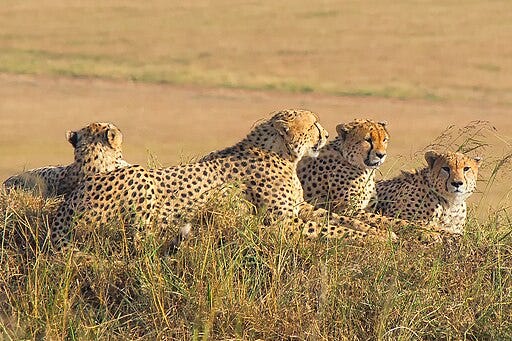Interview: 'Wildlife crime is still treated like a minor offence. That has to change'
Ilaria Di Silvestre of IFAW on how weak laws and online trade fuel wildlife trafficking - and the hidden suffering it causes.
Ilaria Di Silvestre is the director of policy and advocacy for Europe at the International Fund for Animal Welfare, a global NGO aiming to help humans and animals live together peacefully. It lobbies governments to affect policy change to combat wildlife trafficking.
We spoke about the gaps in legislation that allow wildlife crimes to thrive, why cheetahs are popular pets in the Middle East and why the internet has been a disaster for wildlife.
Can you describe your work?
I'm the director of policy and advocacy for Europe, which basically means that I'm coordinating the policy and advocacy work in the region. We have offices in Belgium, in Germany, France, the Netherlands and the UK and we also work with the institutions based in Brussels. We put all of that together to try and achieve policy change.
In Europe, there are two main areas of work: one is marine conservation and the other is wildlife crime. In Europe we particularly focus on wildlife cyber crime.1
We take a science-based approach. So we always try to use data to show the need for changes, for new policy, to show the problems, where there's an issue. That’s the way we operate and we are privileged to have conservation projects in the field which can provide us with that data. We work with enforcement authorities, so we have data on confiscation, on the species that are trafficked; and we use this information to then put pressure on decision makers to highlight gaps and loopholes in legislation.
We provide briefings to policy makers and have regular meetings and events at the European Parliament to present the issues. There is also work on a national level.
Why is wildlife trafficking such a major issue?
Because there's a demand. If there was no demand, there would be no trafficking. That's the main issue.
And then, of course, legislation is out of date. Some of this legislation was adopted 20 or 30 years ago, and sometimes doesn’t take into account new trades, like the online trade. It is quite recent, and it's growing due to social media. This isn’t reflected yet in most of the legislation. We want to make sure that policymakers understand that this should be covered. There are new challenges with trafficking online, and these need to be covered and taken into account.
What are the consequences if we fail to deal with wildlife trafficking?
First of all, you have an impact on the wildlife population. There’s a lot of demand. Populations are depleted in the wild and in some cases we are speaking about species that are already rare or endangered.
Then you have the impact on humans. Local populations use wildlife in a sustainable way, maybe for tourism or local trade. This is affected if these resources are depleted.
It also has an impact on the security of countries. Very often wildlife trafficking is perpetrated by the same criminals that also operate in other forms of organized crime, like arms and weapons. It's the same channels, so the money goes also to these criminal activities.
What are the main barriers to dealing with the online trade?
I think there are two different problems. We have a problem with the legislation. It’s complex but it’s also different in different European member states and also on a global level. People who buy animals online are not always well-informed about the legislation and this also makes it difficult for the platform to monitor this trade.
Are there permits? Is it a CITES-species? Was the animal captive-bred or caught in the wild? demonstrating these things is extremely complex.
Then, fines and penalties in most countries are really not high enough to be a real deterrent. In Europe, we recently succeeded in revising legislation on environmental crime, which, for the first time, establishes some threshold for the minimum level of fine. It's still a bit too low in our view, but it’s a big step forward. Before it was completely left to member states.
Is wildlife crime taken seriously enough by authorities?
It’s still the case in many countries [that wildlife crime is not taken seriously enough]. In some countries it has started to change.



